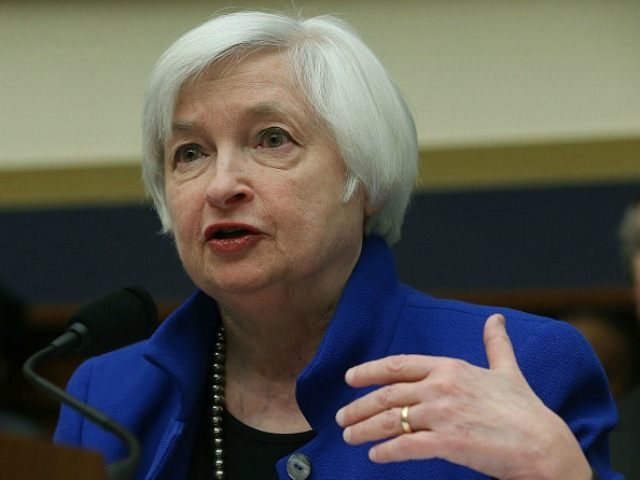The Biden inauguration theme of national unity took hold of the Capitol on Tuesday—at least in the Senate’s confirmation hearing for Joe Biden’s nominee for Secretary of the Treasury.
Janet Yellen glided through her hearing Tuesday, easily dodging the few significant challenges and receiving bipartisan praise from Senators. The hearing highlighted how much easier a time establishment figures have when brought before the Senate compared with the outsiders who Donald Trump tapped for his cabinet.
Yellen, the former Fed chair who presided over the central bank during years in which it typically failed to reach either its targets for price stability or maximum employment, was greeted warmly by Republican and Democratic Senators, many of whom thanked her for her past public service and willingness to serve in government again.
The confirmation hearing provided a stark contrast with the scene four years ago when Steven Mnuchin was barraged with criticism from Senate Democrats in a bruising five-hour hearing.
The bitter partisan attacks on Mnuchin started the day before the hearing, when Senator Elizabeth Warren (D. Mass) held a forum featuring homeowners who had defaulted on mortgage loans made by OneWest Bank, where Mnuchin had been chief executive, and been foreclosed upon. Leftwing pressure groups ran ads attacking Mnuchin, including one claiming that his bank had foreclosed on a homeowner while her husband was suffering from terminal cancer. The mainstream media obsessed over Mnuchin’s wealth and financial disclosures.
By contrast, the run-up to Yellen’s hearing, which she attended by remote video link, was notable for the lack of criticism of her policies as Fed chair or even pointed challenges about incoming Biden administration’s economic plans. From her time at the Fed, Yellen is a familiar figure to Washington insiders, including the Senators on the panel.
During the confirmation hearing in 2017, Democrats leveled an unrelenting attack on Mnuchin, largely based on his background in the financial sector.,
“The treasury secretary ought to be somebody who works on behalf of all Americans, including those who are still waiting for the economic recovery to show up in their communities,” Senator Ron Wyden (D-Oregon), the ranking member on the panel, said. “When I look at Mr. Mnuchin’s background, it’s a stretch to find evidence he’d be that kind of treasury secretary.
The hearing turned so ugly that some on the panel sought to provide reassurance to Mnuchin that he was not as despised as the hearing appeared to signal.
“You’ve certainly impressed a lot of people here, especially me,” Senator Orrin G. Hatch (R-Utah), then the finance committee chair, said. “We’re going to help you get through this ordeal. You have friends on this committee on both sides of the aisle.”
Later, when Democrats delayed the confirmation of Mnuchin by withholding votes, and thereby preventing the committee from reaching the required quorum for a nomination vote, Hatch would say, “You have to go back to the Civil War to find things like this.”
“I will be focused on day one on providing support to America’s workers and to small businesses, putting into effect as quickly and efficiently as I can, the relief in the bill that was recently passed, and then over time working for a second package that I think we need to get through these dark times,” Yellen said.
Asked about she would repudiate President Donald Trump’s policy of unilaterally imposing tariffs on China, Yellen soft-pedaled her criticism while embracing the Biden line about working with allies to reform China.
“I believe we should try to address unfair trade practices. The best way to do that is to work with our allies rather than unilaterally,” Yellen said.
At the same time, however, she echoed the Trump administration’s claim that China had engaged in “abusive, unfair and illegal practices,” singling out “forced technology transfers,” one of the complaints at the heart of Trump’s policy.
Senator Tim Scott (R-S.C.) was gentle and respectful when he asked if Yellen would support a rise in the national minimum wage to $15 at a time when unemployment is very high. Some economists, small business owners, and many Republicans believe that raising the minimum wage discourages hiring, particularly among the lowest-wage employees—the group hit the hardest by the pandemic.
“I think the likely impact on jobs is minimal, that’s my reading of the research,” Yellen said. The claims went unchallenged.
Ms. Yellen urged lawmakers to “act big” to avert a protracted economic slump and put aside concerns about the mounting national debt.
“Economists don’t always agree, but I think there is a consensus now: Without further action, we risk a longer, more painful recession now—and long-term scarring of the economy later,” Ms. Yellen said.
Senator Pat Toomey (R-Penn.) came closest to a pointed question, asking Yellen about the Biden administration’s plans to tax unrealized capital gains. Yellen waived off the question, saying that was one of many ways of dealing with wealth inequality by declining to go into details.
Sen. Toomey asked a substantive question about the prospect of a wealth tax (would Yellen support taxing unrealized gains – e.g. stocks that have increased in value but haven’t been sold yet). She dodged the question.
— Victoria Guida (@vtg2) January 19, 2021
Unlike Democrats four years ago, Republicn Senators do not appear to plan to delay Yellen’s approval by the committee. As the morning session concluded, Senator Mike Crapo (R-Idaho) said he would work with Sen. Grassley to assure a vote “expeditiously,” which may mean as early as Thursday. Many Republicans are expected to vote to confirm, in contrast to four years ago when Joe Manchin (D-W.Va.) was the sole Democrat to confirm Mnuchin.

COMMENTS
Please let us know if you're having issues with commenting.